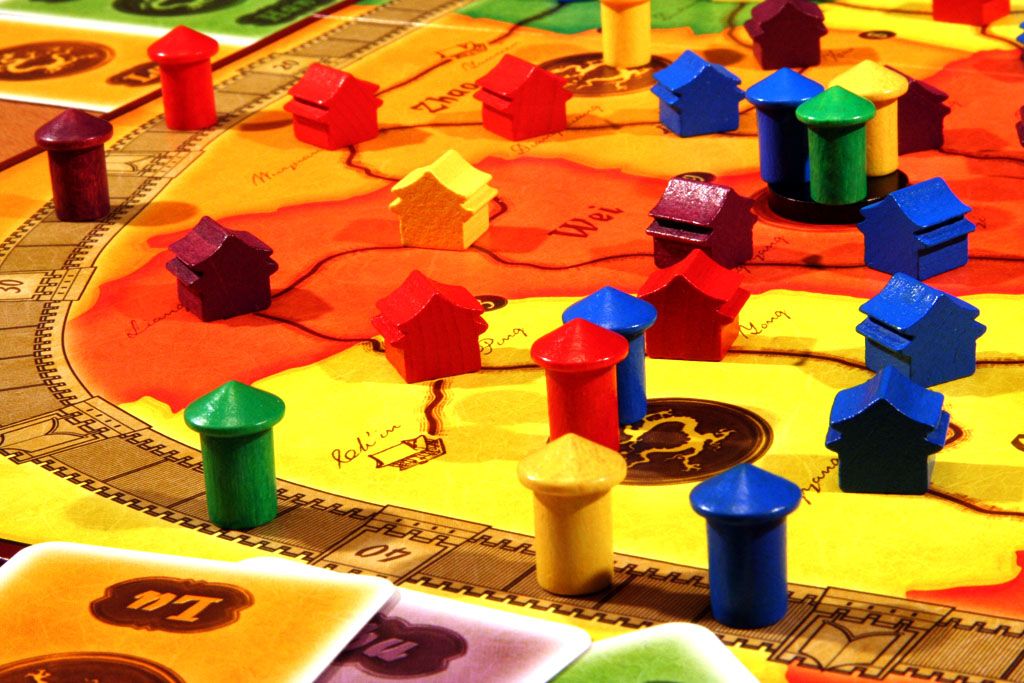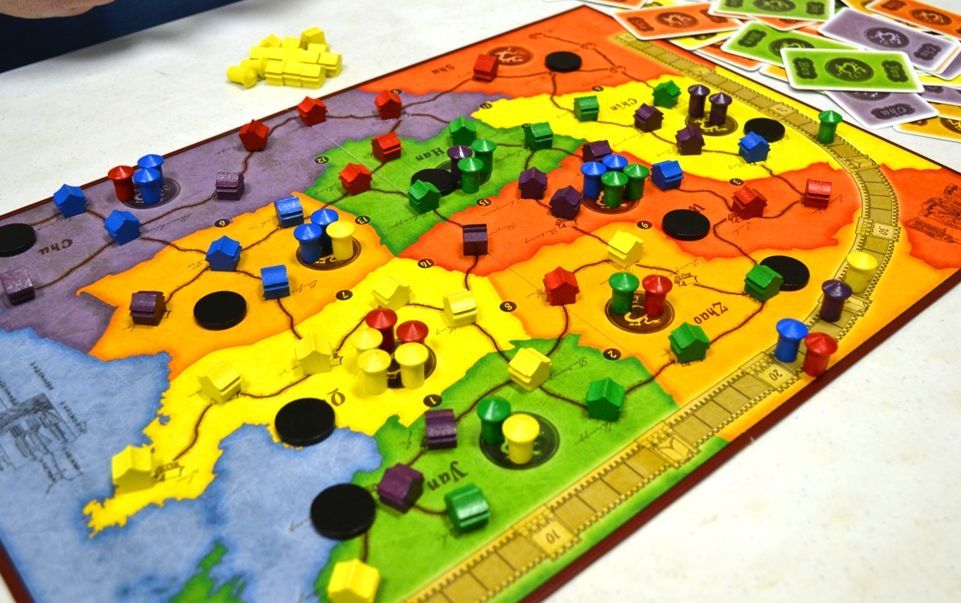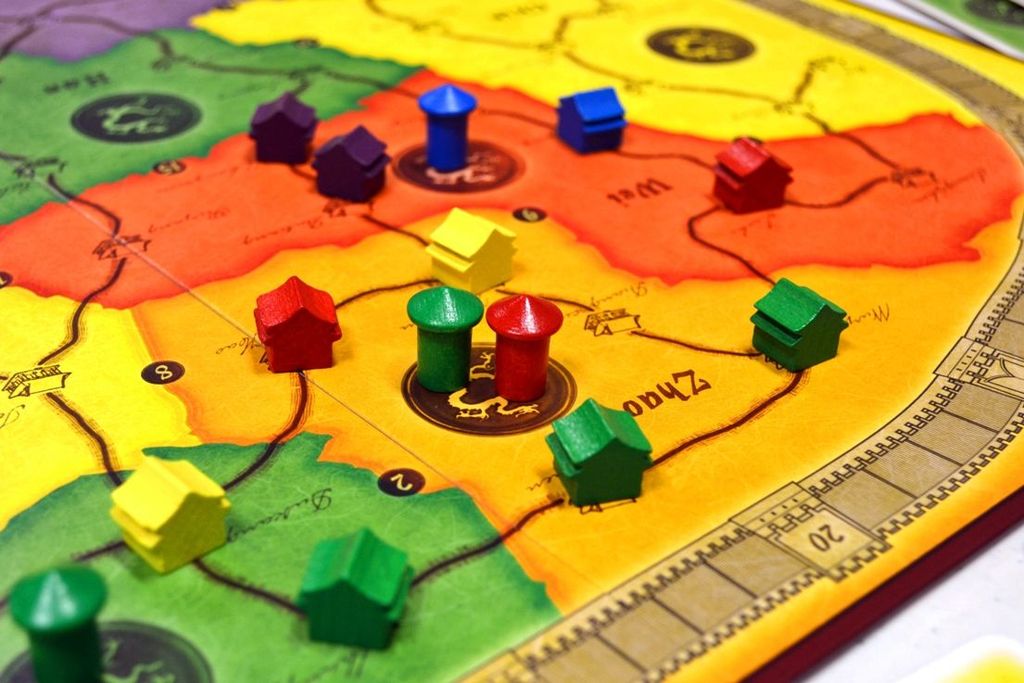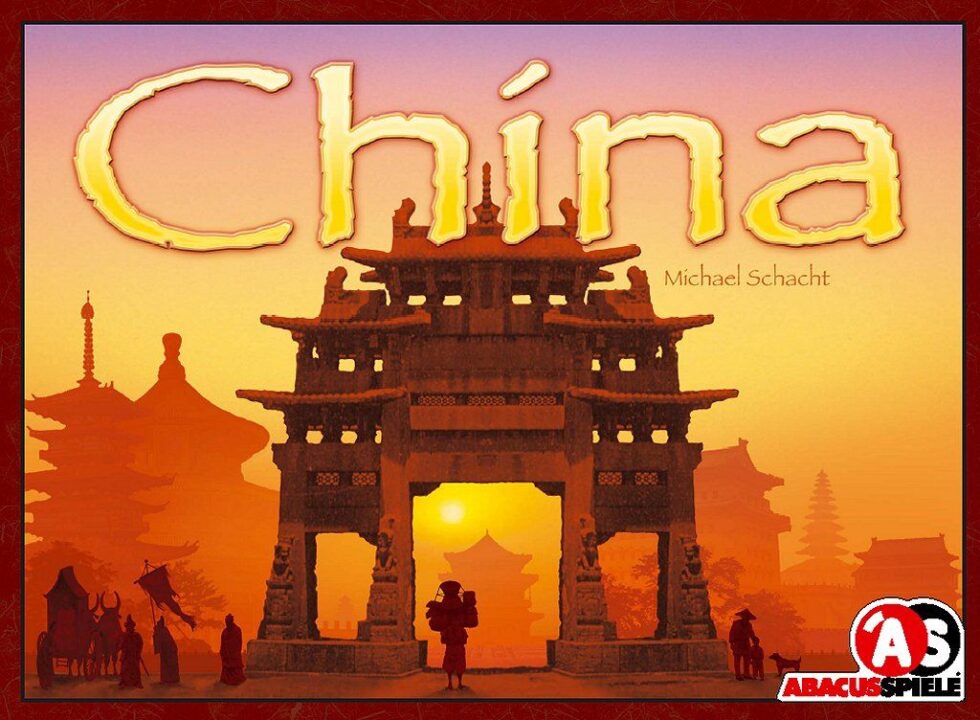Welcome to my review of China! Last Saturday, I sat around my kitchen table with a stack of snacks, three friends, and a hunger for a clever area control game. By the end, we’d all double-checked the rules, plotted a dozen betrayals, and realized we might actually have a new favorite. But does it live up to the table talk and grumbling? Let’s find out before you spring for it yourself.
How It Plays
Setting up
Lay the China board on the table. Give each player a set of houses and emissaries in their color. Shuffle the cards and deal three to every player. Place the scoring track nearby and put everyone’s marker on zero.
Gameplay
On your turn, play up to two cards from your hand. Place houses or emissaries in the matching provinces. Jockey for majorities—whoever rules a province or commands a city gets points. Draw back up to three cards. Try to read your friends’ minds, because they’ll ruin your plans if you’re not careful. There is lots of bumping elbows over territory!
Winning the game
Once someone can’t play anymore, count up the points. Whoever got the most influence by placing their bits in the right spots wins. It’s not about luck—it’s about being one sneaky strategist.
Want to know more? Read our extensive strategy guide for China.
Gameplay Depth and Player Interaction in China
Let me tell you—one of my favorite things about China is how it makes you second-guess every move, like you’re playing chess with your own sanity. The gameplay depth is sneaky! First time I played, I thought, ‘Hey, I’ll just plop down my houses wherever there’s a spot.’ Ten turns later, I was getting stomped by my apparently psychic friend Ed, who saw all my mistakes miles in advance. Nothing bruises your ego like losing to someone who snacks on microwave burritos during their turns.
China runs on area control and sneaky influence. Each decision feels like it matters. When you place your officials or houses, you set off a ripple of ‘Oh no, why did I do that?’ throughout the table. The board is tight, so you’re constantly bumping elbows with other players. I once tried to build an epic network, but my friend Lisa blocked me with a smug grin. She claimed she was just ‘following the strategy,’ but let’s be real, she did it for maximum pain. Alliances, betrayals, stares that last a little too long—it’s all part of China’s charm.
You can’t play solo here—even if you’re quiet, other folks will crash your plans. I love that the game pushes folks to watch each move and react. The tension runs high, and table talk is half the fun. You learn who at your table is a ruthless tyrant and who just wants everyone to get along. The interaction is constant, and every round feels different, which totally keeps things fresh.
If you think China’s all brain and no chance, stick around, because next up I’ll spill the beans about how this game wrestles with strategy and luck—sometimes leaving you cheering, sometimes crying into your meeples.

Strategy Versus Luck: Who’s Really in Charge in China?
When I first got my hands on China, I held my breath. I’m not a fan of games where the winner is just the luckiest person at the table, not the cleverest. No worries here! China leans hard toward strategy, not luck. The game gives you choices with every turn—should you place an official in the city, build a house in the country, or sneak into a rival’s perfectly planned area and throw things into chaos? The answer is about outsmarting your friends, not just hoping the game decides in your favor.
Luck does make a tiny cameo. Your hand of cards (which limit where you can act on the map) is random, so sometimes you just can’t get in the region you want. But the card draw has never ruined my master plan. It just makes me squirm a little and think on my feet. I’ve seen both newbies and seasoned gamers win China, but always because they planned smarter—not because they rolled better.
If you mess up, it’s usually your own fault. There’s almost always another move to make, so you don’t feel trapped by bad luck. This is the kind of balance that makes me want to play China again and again—I feel like my brain gets a workout, not just my dice-rolling wrist.
So, if strategy is your thing and you hate feeling at the mercy of random events, China hits the sweet spot. Next up, we’ll see if the pieces in China are as good-looking as my sneakiest moves—let’s talk component quality and table presence!

Component Quality and Table Presence: China’s Looks and Feels
The first thing you notice when you crack open the box for China—besides the secret hope the game will teach you to master chopsticks—is how simple everything looks. Don’t expect a table covered in glitter or glowy plastic. The map is clean and a bit bland, but it does the job. At first, I worried the board might look like it came free with a kid’s geography textbook. But after a few rounds, I realized the clear layout actually helps you plot and scheme without squinting.
The houses and emissary tokens are small, chunky, and oddly satisfying to plop onto the board—no weird shapes, just colored wood in classic Euro fashion. My friend Rita kept calling them “little monopoly houses with a European degree.” I once dropped a token on the floor and my cat ignored it, which is probably a sign they’re not very flashy. But hey, nothing distracts from the gameplay!
If you love tons of miniatures and fancy coins, China won’t thrill you. But everything here feels sturdy and practical, which is great for people like me who spill soda with the frequency of a caffeinated toddler. The color palette is muted, so don’t expect fireworks, but at least you won’t mix up your pieces—unless you’re playing with my colorblind buddy who almost started a diplomatic incident over blue and purple.
Next up, I’ll tell you if playing China over and over is as fun as that first time, or if it gets old faster than my bad puns.

Replayability and Game Length: Is China Worth Multiple Visits?
One of my favorite things about China is how it brings something new to the table every time we play. I’ve played it with sneaky friends, loud friends, and even with my cousin who once tried to negotiate a peace treaty in Monopoly (long story, don’t ask). What I’m saying is, you never get the same game twice. Strategy changes based on who’s playing, and where those little houses and officials pile up. Every game, someone finds a new horrible way to block my best move, and I respect that—even if I grumble about it over snacks.
So, replayability? Big thumbs up. You’ll want to play again just to prove you can do better, or at least to take revenge on whoever out-maneuvered you last time. There’s no big “gotcha” moment or wacky rule that shakes up the whole structure though, so if you crave wild surprises every single time, China keeps it a bit more grounded.
About game length: You won’t need to call in sick to finish a round. Most games clock in around 45 minutes. It’s long enough to feel like you’ve battled and schemed, short enough to convince people to play “just one more”. I usually find that by the time we clean up, someone is already plotting out their moves for next session.
Do I recommend China? Absolutely! It’s a game that keeps your brain humming without taking all night. As long as you like strategy and don’t throw a fit if your plan goes sideways, you’ll have a blast. Just watch out for sneaky cousins.
Conclusion
Alright, that’s a wrap on my China review! This sneaky little game packs a punch with its clever strategy and player meddling. You won’t find much luck here—just lots of backstabbing and plotting, which I loved (unless my friends gang up on me, then I don’t love it as much, but hey, that’s life). The pieces are no-nonsense, and the game plays fast, so you’ll want a rematch right away. Sure, it could look a bit fancier, but the brains you need to win more than make up for it. If you like games where you can outsmart your friends without flipping the table, China is a solid choice. Thanks for reading, and may you always have just one more house than your rivals!


